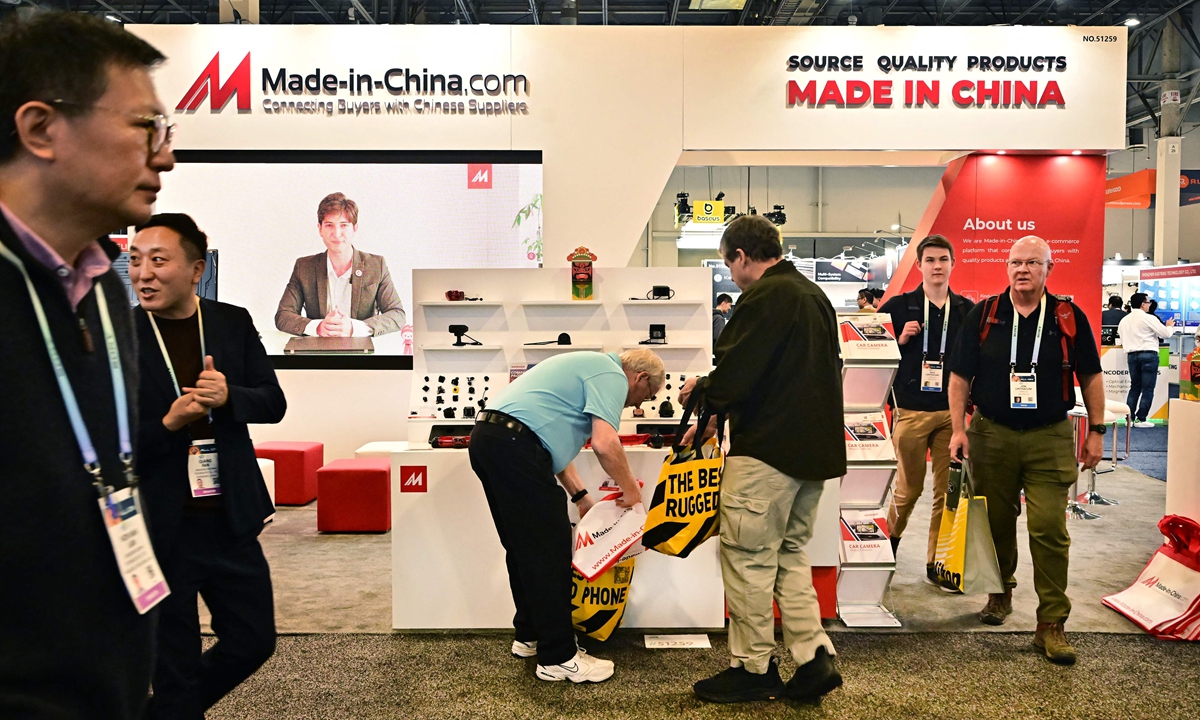
People walk past the Made-In-China.com booth at the Consumer Electronics Show (CES) on January 10, 2024 in Las Vegas, Nevada. Chinese companies are back in full force at CES this year more than doubling the number of exhibitors from last year. (Photo: VCG)
If the US restricts Chinese companies from participating in the Consumer Electronics Show (CES), these actions could create further challenges for the US market and consumers, a Chinese expert said, following a report exposed that Chinese tech workers report US visa issues despite CES invitations.
Many employees of Chinese tech companies preparing to attend CES in Las Vegas have reportedly encountered "unprecedented" US visa denials, despite holding official event invitations, according to the South China Morning Post (SCMP) on Saturday.
"We are aware of some CES attendees and exhibitors from China whose business travel visa applications are being denied," a CES spokesperson said in an email, according to SCMP. "We encourage the US government to expedite and approve visas for individuals who are travelling to the US for legitimate business reasons," the spokesperson said.
Chris Pereira, the founder of iMpact, a New York-based consultancy, posted this month on LinkedIn that during a cross-cultural leadership training programme for Chinese companies expanding abroad, he learned that "half of the 40 companies in attendance reported their staff were being denied visas, despite holding official invitation letters from CES." Since his post, Pereira said in an interview, at least three more clients had reported employees had been denied visas to attend CES, according to SCMP.
Exhibitions like CES were "wonderful opportunities for business exchanges between companies from China, the US and the rest of the world," Pereira told SCMP, noting that "it is frustrating to see even events like this being impacted."
The rejection of the CES visa is another example of the US government's intention to reduce exchanges between China and the US. The US has consistently been the biggest obstacle to normal interactions in various areas, including economic and cultural exchanges between the two countries. This situation is akin to "lifting a rock only to drop it on one's own feet," a Chinese expert said.
Obstructing Chinese companies' participation in CES would disrupt consumer electronics trade between the two sides, and "if the US curtails routine economic and trade activities in this sector, it will create further challenges for the US market and consumers," He Weiwen, senior fellow of the Center for China and Globalization, told the Global Times on Saturday.
In the field of consumer electronics, China and the US complement each other in technologies, products, and markets. China brings many advanced technologies and a large number of electronic products for American consumers, which helps lower inflation, enrich the US market supply, and benefit American consumers, He said.
Approximately 4,000 global exhibitors are set to participate in CES in January 2025, with over 30 percent expected to represent Chinese companies, according to SCMP.
"Chinese companies are the main force of CES exhibitors over the years… We hope that the US will work with China to reduce policy obstacles such as visa and entry, take concrete actions to support and encourage more exchanges between people from business, S&T and other sectors of the two countries," Liu Pengyu, a spokesperson for the Chinese Embassy in the US, said on X on Saturday.
"Promoting exchanges and cooperation in the global consumer electronics industry is the common wish of enterprises of all countries. It is conducive to connecting the global consumer electronics industrial chain and supply chain, and injecting fresh momentum into the global economy," the spokesperson said.
Chinese companies have maintained a strong presence at CES since 1991. However, in recent years, their participation has varied due to increasing US restrictions. A record high of 1,551 Chinese firms took part in CES in 2018, but attendance dropped to 210 in 2021, 159 in 2022, and 493 in 2023, according to SCMP.
Amid growing US restrictions on routine trade and business exchanges, many Chinese companies are increasingly apprehensive about rising uncertainties, as even routine and lawful trade interactions are at risk of encountering unexpected hurdles, He said. The US needs to adopt a cooperative approach with China in the electrics consumption sector, aiming for mutual benefit and win-win outcomes, while abandoning outdated Cold War mentalities, He added.




